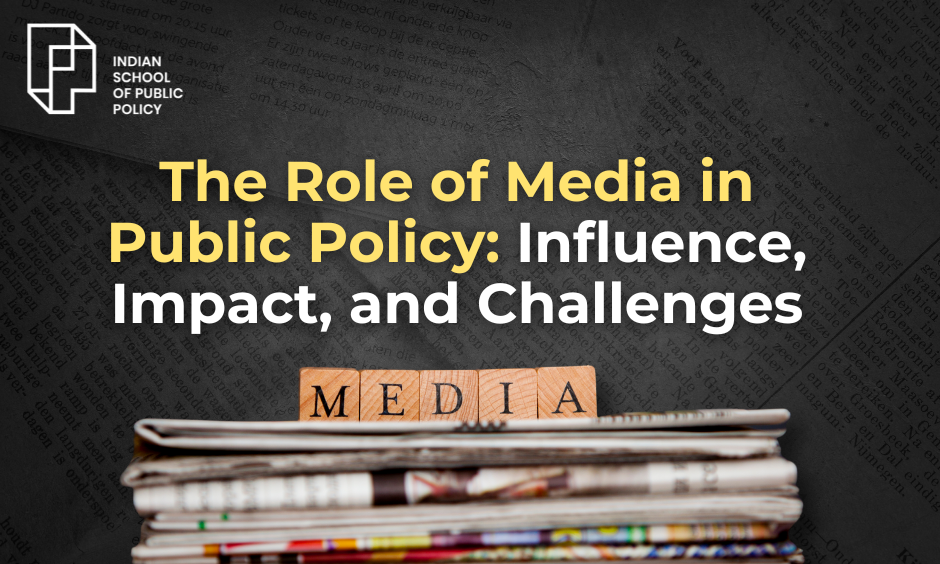
The Role of Media in Public Policy: Influence, Impact, and Challenges

The purpose of this blog is to delve into the intricate relationship between the media and Public Policy. We’ll explore how the media influences policymaking, shapes public perception, and holds democratic governments accountable. By examining specific case studies and theoretical frameworks, we aim to understand the vital role of media in Public Policy and its implications for democracy and governance.
What are the key stages in the policy-making process?
The key stages in Public Policymaking include:
- Problem Identification: Recognising and defining issues that require government intervention.
- Agenda Setting: Prioritising issues and determining which ones will be addressed.
- Policy Formulation: Developing strategies and proposals to address the identified issues.
- Policy Adoption: Officially deciding on the proposed policies through legislative or executive actions.
- Policy Implementation: Putting adopted policies into action through government agencies and programs.
- Policy Evaluation: Assessing the effectiveness and impact of implemented policies.
How does the media influence policy making?
The role of media in Public Policy is crucial in setting the agenda for public discourse. The media decides which issues are highlighted and given priority, thereby influencing what policymakers consider important. By focusing on certain topics, the media can bring attention to issues that may have otherwise been ignored.
How does media framing shape public perception and policy outcomes?
Media framing involves presenting information in a way that influences how the public perceives issues. The way news stories are framed can shape opinions and attitudes, thereby affecting public support or opposition to policies. This can significantly impact policy outcomes, as policymakers often respond to public opinion.
What is the media’s role in government accountability?
In a democracy, the role of media and democracy are intertwined. The media acts as a watchdog, scrutinising government actions and holding officials accountable. Investigative journalism exposes corruption, inefficiency, and abuse of power, thereby ensuring transparency and accountability in governance.
What is the relationship between media and democracy?
The role of media in democracy is fundamental. It provides a platform for public debate, informs citizens about governmental actions, and ensures that diverse viewpoints are represented. By doing so, the media fosters an informed electorate, which is essential for a functioning democracy.
Why is press freedom essential for democracy?
Press freedom is crucial for democracy because it allows the media to operate independently and without fear of reprisal. This independence is necessary for the media to perform its watchdog role effectively, ensuring that government actions are transparent and accountable to the public.
What responsibilities does the media have in a democracy?
What are the ethical responsibilities of media in reporting?
The media has a responsibility to report accurately, fairly, and without bias. Ethical journalism involves verifying facts, providing balanced coverage, and avoiding sensationalism. The role of media to the public is to inform and educate, not to mislead or manipulate.
How can the media balance sensationalism and responsible journalism?
While sensationalism can attract viewers and readers, responsible journalism prioritises accuracy and integrity. Media outlets must strive to provide comprehensive coverage that goes beyond headlines, offering in-depth analysis and context. This balance ensures that the public receives information that is both engaging and truthful.
What challenges does media face in influencing Public Policy?
How does media ownership and bias affect reporting?
Media ownership concentration can lead to biased reporting, as media conglomerates may prioritise their interests over public good. This bias can skew public perception and influence policy debates. Diverse and independent media ownership is crucial for ensuring a plurality of voices and perspectives.
What are the consequences of sensationalism in media?
Sensationalism can distort public understanding of issues by prioritising dramatic and shocking stories over substantive reporting. This can lead to misinformed public opinion and misguided policy responses. Responsible journalism is essential to ensure that media coverage contributes positively to public discourse.
How does government censorship impact media effectiveness?
Government censorship undermines the role of media in democracy by restricting the flow of information. It hampers the media’s ability to hold the government accountable and diminishes public trust. An independent media free from censorship is vital for a healthy democracy.
Case studies of media Impacting Public Policy?
| Case study: The role of the media during the 2008 global food crisis. During the 2008 global food crisis, media coverage played a critical role in shaping policy responses. Reports highlighted the plight of vulnerable populations affected by rising food prices, pressuring governments to implement measures such as subsidies and export restrictions. In India, media attention prompted the government to introduce policies to stabilise food prices and support the poor. |
Case study: Gujarat riots illustrate the consequences of bias. The media coverage of the 2002 Gujarat riots demonstrated how biased reporting can exacerbate communal tensions. While some media outlets provided balanced reporting, others sensationalised the violence, which inflamed public sentiment and influenced policy responses. This underscores the need for responsible journalism. |
What is the global perspective on the role of media in Public Policy?
The global influence of media on Public Policy demonstrates its power to mobilise public opinion and drive social change. It highlights the importance of a free and independent press in addressing global issues and holding governments accountable. The role of media in Public Policy is crucial for fostering informed and engaged societies.
| Media influenced policy changes through international movements like Black Lives MatterThe Black Lives Matter movement exemplifies how the media can drive policy change on a global scale. Extensive media coverage of racial injustices in the United States led to widespread protests and calls for police reform. This movement also inspired similar debates and policy initiatives in other countries, including Public Policy India. |
Conclusion
The role of media in Public Policy is multifaceted and vital. It sets the agenda, shapes public perception, holds governments accountable, and can drive policy changes through public pressure. However, the effectiveness of the media depends on its independence, ethical standards, and ability to balance sensationalism with responsible journalism.
The complex relationship between media and Public Policy underscores the need for highly qualified and skilled public policymakers. These individuals can navigate the intricacies of policymaking, leverage media influence effectively, and ensure that policies are well-informed and equitable. Becoming a part of the Public Policy space requires formal education. If you are interested, there are two main programmes that are extremely popular and valuable: Master of Public Policy and Post Graduate Programme in Public Policy. These programmes equip professionals with the knowledge and skills necessary to make impactful contributions to Public Policy and governance.
Source – https://prsindia.org/policy/analytical-reports/state-agriculture-india#:~:text=It%20is%20the%20highest%20producer,13%25%20to%20the%20wheat%20production
Learn how to help farmers double their income by 2025 with new policy reforms.
- Inefficient Resource Utilisation – The country faces underemployment and disguised unemployment, particularly in agriculture. This leads to low agricultural output and a decline in living standards.
- Low Rate of Economic Development – Economic development in India was particularly sluggish during the first 40 years post-independence, prior to the economic reforms of 1991.
- Price Rise – Continuous price increases have burdened the poor. While some have benefited, lower-income groups have struggled to meet basic needs due to rising costs.
- Unemployment – The rising population has resulted in more job seekers, but job opportunities have not expanded sufficiently to meet this demand, contributing to poverty.
Master’s in Public Policy vs Post Graduate Programme in Public Policy
India is home to numerous Public Policy colleges offering two main types of programs. Determining which one suits your needs is crucial.
| Master’s in Public Policy (MPP) The Master’s in Public Policy (MPP) program delves into the intricacies of government policies and their societal impacts. It provides a robust foundation for implementing, analysing, and evaluating public policies. Graduates often find careers in government, nonprofits, or international organisations. | Post Graduate Programme (PGP) in Public Policy The Post Graduate Programme (PGP) in Public Policy in India focuses on enhancing students’ policy-making skills and effective implementation of public policies. This program prepares students for various roles within the field. The curriculum includes subjects like economics, political science, and law, with a strong emphasis on analytical skills and research methodologies. Graduates are well-prepared to evaluate policy issues and develop evidence-based solutions. |
When selecting a programme, it is essential to consider the admission criteria and the career opportunities.
The Indian School of Public Policy (ISPP)
The Indian School of Public Policy (ISPP) aims to develop a new cadre of policy leaders for India and its neighbouring regions. Its premier programme in Public Policy, Design & Management (PDM) targets individuals eager to make a notable impact in the Public Policy sector.
The flagship PDM curriculum provides a thorough understanding of Public Policy, integrating design and management principles to create adept systems thinkers and policy executives.
Learn more about the PDM curriculum.
Register your Interest to Study at ISPP
Interested? Apply now!!
FAQS
What is the role of the media in public policy?
The media plays a crucial role in public policy by shaping public opinion, informing citizens, holding governments accountable, and influencing policy agendas and decisions.
How does the role of the media impact democracy?
In democracies, the media acts as a watchdog, ensuring government transparency and accountability. It facilitates informed citizenry and promotes democratic participation and debate.
What role does the media play in determining public policy?
The media determines public policy by highlighting issues, framing public discourse, and influencing policymakers through public opinion and investigative journalism.
What is media public policy?
Media public policy refers to the regulations and guidelines governing media operations, ensuring freedom of the press, and maintaining ethical standards in reporting and broadcasting.
How does the media influence policy outcomes in India?
In India, the media influences policy outcomes by raising awareness of critical issues, shaping public debates, and pressuring the government to act through widespread coverage and public opinion.
Why is the media considered the ‘Fourth Estate’ in democracies?
Media is termed the ‘Fourth Estate’ because it serves as an independent check on the powers of the government, safeguarding democratic processes and ensuring accountability.
What are the main challenges faced by the media in influencing public policy?
Challenges include media consolidation, political interference, misinformation, limited investigative resources, and the balancing act between being informative and entertaining.


